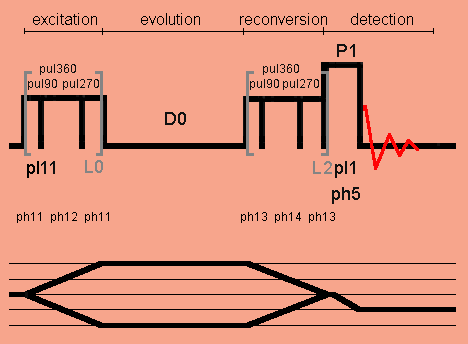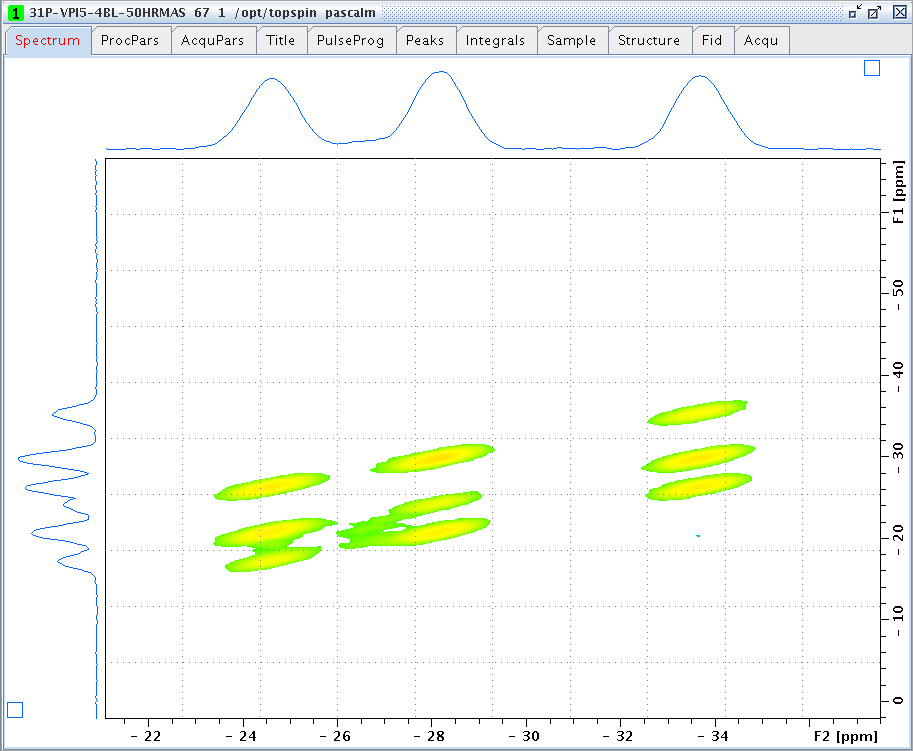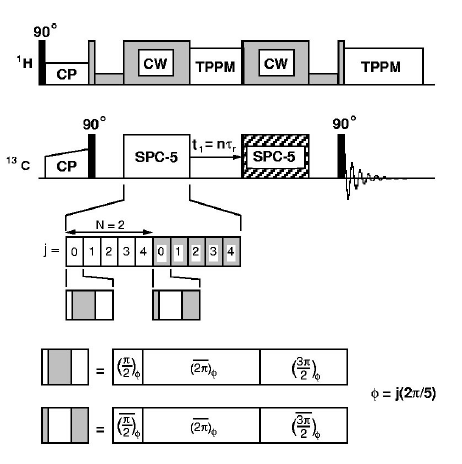
SPC52d: 2D double quantum excitation 180°-phase shift supercycled POST-C5 pulse program for TopSpin2.1

SPC52d: 2D double quantum excitation 180°-phase shift supercycled POST-C5 pulse program for TopSpin2.1

Since non-phase cycling is applied to the SPC5 excitation pulse, four-phase cycling is applied to the detection pulse P1 for selecting the 0Q -> -1Q coherence order jump, and four-phase cycling is applied to the SPC5 reconversion pulse for filtering DQ coherences.
;spc52d (TopSpin 2.1) ;modified for AVIII by HF, May 14, 07 ;2D SQ-DQ correlation experiment with SPC5 sequence ;for the original C7 sequence see: Lee et al. Chem Phys Lett 242, 304-309, 1995 ;see Hohwy, Rienstra, Jaroniec and Griffin, JCP 110, 7983, 1999 ;Avance III version ;parameters: ;d1 : recycle delay ;d0 : min. delay in t1 evolution ;p1 : f1 presaturation pulses and detection pulse at pl1 ;pl2 : =120dB, not used ;pl11 : for SPC5 recoupling sequence B1=5*cnst31 in Hz ;cnst31 : spinning speed ;in0 : =l3*(1s/cnst31), t1 increment multiple of rotor periods ;l0 : number of composite SPC5 cycles multiple of 5 in DQ excitation ;l2 : number of composite SPC5 cycles multiple of 5 in DQ reconversion ;l20 : # of pulses in saturation pulse train ;ns : 16*n ;mc2 : STATES-TPPI ;nd0 : 1 ;FnMode : undefined ;WDW : F1 QSINE 3, F2 QSINE 2 or EM ;use "xau xfshear rotate" to shift spectrum suitably along f1 ;zgoptns :-Dpresat or blank ;$COMMENT=SQ-DQ experiment with SPC5 sequence ;$CLASS=Solids ;$DIM=2D ;$TYPE=direct excitation ;$SUBTYPE=homonuclear correlation ;$OWNER=Bruker define pulse pul360 "pul360=(1s/cnst31)/5" ;360° pulse define pulse pul90 "pul90=(0.25s/cnst31)/5" ; 90° pulse define pulse pul270 "pul270=(0.75s/cnst31)/5" ;270° pulse define loopcounter count ;for STATES-TPPI procedure "count=td1/2" ;and STATES cos/sin procedure "d31=(1s/cnst31)" "in0=l3*d31" "inf1=l3*d31" ;cnst11 : to adjust t=0 for acquisition, if digmod = baseopt "acqt0=1u*cnst11" #include <rot_prot.incl> ;protect for too slow rotation ze ;acquire into a cleared memory "d0=1u" ;make sure a short d0 is used initially 1 d31 #ifdef presat ;set with -Dpresat pres, d20 ;delay between saturation pulses (p1 pl1 ph1):f1 ;saturation loop if required lo to pres times l20 #endif /* presat */ 2 d1 ;recycle delay 1m rpp11 ;reset the phase ph11 pointer to the first element 1m rpp12 ;reset the phase ph12 pointer to the first element 1m rpp13 ;reset the phase ph13 pointer to the first element 1m rpp14 ;reset the phase ph14 pointer to the first element 1u pl11:f1 ;switch to SPC5 RF condition 3 pul90 ph11 ipp13 ipp14 ;SPC5 DQ excitation ;increment reconversion phase ph13 and ph14 pointers pul360 ph12 ipp12 ;increment phase ph12 pointer pul270 ph11 ipp11 ;increment phase ph11 pointer lo to 3 times l0 ;l0 = multiple of 5 4 d0 ;double-quantum evolution period 5 pul90 ph13 ;SPC5 DQ reconversion pul360 ph14 ipp14 ;increment phase ph14 pointer pul270 ph13 ipp13 ;increment phase ph13 pointer lo to 5 times l2 ;l2 = multiple of 5 (p1 pl1 ph5):f1 ;detection pulse, flip into the xy plane 2u gosc ph31 ;gosc does not loop to 1 ;start ADC with ph31 signal routing ;DQ filtering (four phase cycling): 40u ip13*16384 ;increments all phases of ph13 by 90° 40u ip14*16384 ;increments all phases of ph14 by 90° lo to 1 times ns ;next scan 100m wr #0 if #0 zd ;delay for disk I/O, store signal, ;increase FID number ;delete memory data ;do not perform dummy scans ;with next acquisition 1m ip11*8192 ;increments all phases of ph11 by 45°, ;90° phase for DQ coherence 1m ip12*8192 ;increments all phases of ph12 by 45°, ;90° phase for DQ coherence lo to 1 times 2 ;t1 quadrature detection 1m id0 ;1m rp11 ;reset all phases of ph11, ph12, ph13, and ph14 ;1m rp12 ;to their original values, i.e. to the values they ;1m rp13 ;had before the first ip11, ip12, ip13, and ip14 ;1m rp14 ;in case of STATES remove semicolon at beginning of the 4 lines lo to 1 times count ;count = td1/2 HaltAcqu, 1m exit ph1= 0 ;for saturation pulse ph11= (65536) 0 13107 26214 39322 52429 32768 45875 58982 6554 19661 ph12= (65536) 32768 45875 58982 6554 19661 0 13107 26214 39322 52429 ph13= (65536) 16384 29491 42598 55706 3277 49152 62259 9830 22937 36044 ph14= (65536) 49152 62259 9830 22937 36044 16384 29491 42598 55706 3277 ph5= 0 0 0 0 2 2 2 2 1 1 1 1 3 3 3 3 ph31 = 0 2 0 2 2 0 2 0 1 3 1 3 3 1 3 1 ;ph31 = ph5 + 2*ph13

31P 180°-phase shift supercycled POST-C5 (SPC5) DQ-SQ spectrum of VPI-5 zeolite; rotor spinning speed: 14 kHz.
Pulseprogram parameters for spc52d.ppm:
| General | |
| PULPROG | spc52d.ppm |
| TD | 1024 |
| NS | 64 |
| DS | 0 |
| SWH [Hz] | 12500.00 |
| AQ [s] | 0.0410100 |
| RG | 4 |
| DW [µs] | 40.000 |
| DE [µs] | 6.50 |
| CNST11 | 0.0000000 |
| CNST31 | 14000.0000000 |
| d0 [s] | 0.00000100 |
| D1 [s] | 5.00000000 |
| D20 [s] | 0.10000000 |
| d31 [s] | 0.00007143 |
| in0 [s] | 0.00007143 |
| L0 | 55 |
| L2 | 55 |
| L3 | 1 |
| L20 | 20 |
| ZGOPTNS | -Dpresat |
| count | 84 |
| Channel f1 | |
| NUC1 | 31P |
| P1 [µs] | 3.50 |
| PL1 [dB] | 8.00 |
| PL1W [W] | 55.57575989 |
| PL11 [dB] | 7.50 |
| PL11 [W] | 62.35702896 |
| pul270 [µs] | 10.71 |
| pul360 [µs] | 14.29 |
| pul90 [µs] | 3.57 |
| SFO1 [MHz] | 202.4826413 |
Acquisition parameters:
| F2 | F1 | |
| Experiment | ||
| PULPROG | spc52d.ppm | |
| AQ_mod | DQD | |
| FnMODE | undefined | |
| TD | 1024 | 168 |
| NS | 64 | |
| DS | 0 | |
| TD0 | 1 | |
| Width | ||
| SW [ppm] | 61.7336 | 69.1403 |
| SWH [Hz] | 12500.000 | 13999.720 |
| IN_F [µs] | 71.43 | |
| AQ [s] | 0.0410100 | 0.0060001 |
| Nucleus1 | ||
| NUC1 | 31P | 31P |
| O1 [Hz] | -2029.70 | -2029.70 |
| O1P [ppm] | -10.024 | -10.024 |
| SFO1 [MHz] | 202.4826413 | 202.4826413 |
| BF1 [MHz] | 202.4846710 | 202.4846710 |

Definition of SPC5 excitation pulse.